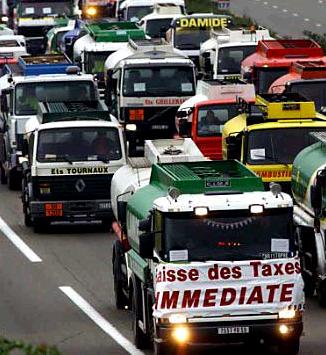| current issue |
| gay mundo |
| bush plus |
| race/class |
| nyc |
| africa |
| americas |
| asia |
| europe |
| arts series |
| gully español |
| about us |
| contact us |
| submit |
| subscribe |
| letters |
| archive |
| action resources |
| search |

The oil shortage in the U.S. is due both to recklessly rising consumption—think SUVs—and our limited refining capability.
 Related Gully Coverage
Related Gully Coverage

French truckers protest the heavy diesel tax.
Don't Blame Venezuela
by Toby Eglund
SEPTEMBER 13, 2000. In a vision of things to come, oil protests are worsening in Europe where heavy taxes, added to surging oil and gasoline prices, are crippling consumers. Demonstrators have blocked refineries and depots in France, and across Britain, where Prime Minister Tony Blair is considering emergency measures. Protests have now spread to Germany, Belgium, Italy, Ireland, and Spain, and are expected to hit Eastern Europe soon.
Crude oil has skyrocketed to $35-a-barrel, a ten-year high. Fearing an end to the good times subsidized by ridiculously low oil prices—as low as $10-a-barrel in 1998—the United States, Western Europe and industrialized Asia asked OPEC to raise production. The Organization of Petroleum Production Countries unenthusiastically obliged, agreeing last week to pump 800,000 more barrels daily. This was OPEC's third production hike in a year, for a total of 3 million extra barrels a day.
The move was more political and psychological—signaling OPEC's willingness to do its part to hold oil prices down—than practical, since most of those barrels were already reaching the market via quota cheating by some OPEC members. The raise simply makes cheating barrels honest. A more significant raise could be agreed on at OPEC's September 27 meeting in Caracas, Venezuela, though, with the exception of Saudi Arabia, most members are already pumping to capacity.
Breaking the Oil Addiction
Both OPEC and the governments of the biggest oil-addicted nations know full well, however, that production cannot increase endlessly, and that increasing it is not enough to hold down prices, anyway.
Besides production, availability and price of this non-renewable resource are also affected by a variety of other factors including taxation, which in Europe and Asia is extremely high. The shortage in the United States is due both to recklessly rising consumption—think SUVs—and our limited refining capability, which has not expanded much since the Carter-era oil crisis. Stock market speculation in oil has also pushed prices artificially high.

Nevertheless, in an election year, blaming OPEC, and Hugo Chavez, Venezuela's oil-activist president, could be tempting, particularly for the sagging, Big Oil-connected Bush-Cheney campaign.
While the Clinton Administration has treated Chavez with frigid caution, occasionally chiding and snubbing him (no high-ranking Administration official attended his two recent Presidential inaugurations, for example), a Republican White House may be less forbearing. Already, Congress Republicans have reviled Chavez for his refusal to allow U.S. anti-drug aircraft to fly over Venezuela.
Chavez and OPEC
Chavez, widely credited with reviving the moribund organization, wants OPEC to keep prices stable in a $22 to $28-a-barrel range, high enough for developing oil producers to develop, yet still reasonable enough to keep the global economy churning. This would require an unprecedented degree of discipline and solidarity within OPEC, many of whose members routinely cheat on the quotas assigned to them, often caving in to outside pressure.
So, while Chavez is more an oil 'hawk' than previous Venezuelans who routinely bowed to U.S. interests, even the greediest OPEC member is aware that too high prices could trigger a world-wide economic slowdown and inflation, lowering demand and prices.
Scapegoating Chavez and OPEC for an oil crisis that we have largely brought upon ourselves would serve no useful purpose, other than scaring up the few thousand votes needed by either candidate to win a brutally tight Presidential election.
Unfortunately, electoral demagoguery has a way of snowballing into state policy. Oil scapegoating could prevent the much needed emergence of a fair and rational global energy policy. It could also dust off the crude colonial script that has brought us such anti-American blockbusters as Cuba and Iran.
Related links:
For the Venezuelan point of view.
For OPEC.
For everything you ever wanted to know About Crude Oil (Petroleum).
For the pessimistic Japan Times editorial (Sept. 12), Third Oil Shock Still on the Horizon.
For the optimistic The Times of India editorial (Sept. 12), Oil's Well .
 The Gully In Depth
The Gully In Depth
New World
![]() Our Americas. Politics, democracies, failed utopias, and the sullen heirs of colonialism: from Canada to Argentina.
Our Americas. Politics, democracies, failed utopias, and the sullen heirs of colonialism: from Canada to Argentina.
Bush Plus
![]() All about the morass of U.S. politics, George W. Bush, Dems, Greens, GOPs, activists, silently irritated masses and global impact.
All about the morass of U.S. politics, George W. Bush, Dems, Greens, GOPs, activists, silently irritated masses and global impact.